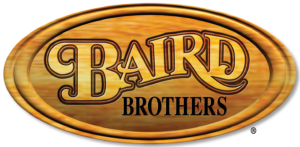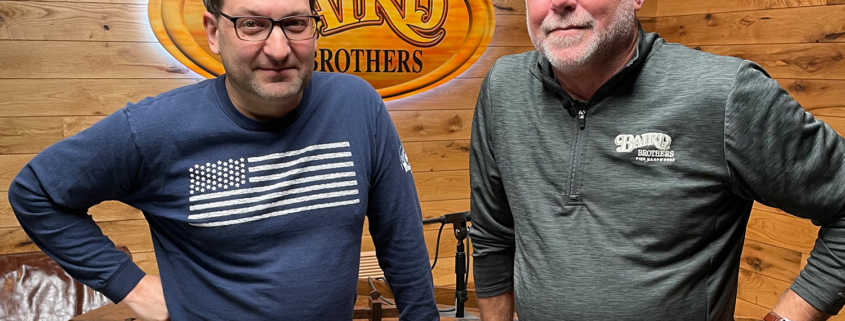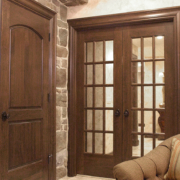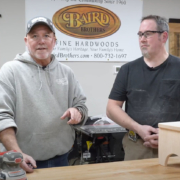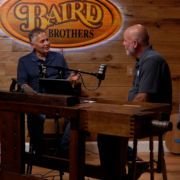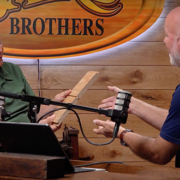The Benefits of an Experienced Sales Team with Baird Brothers’ Derek Donatelli
Steve Stack:
Brought to you direct from Studio 3B at Baird Brothers Fine Hardwoods, American Hardwood Advisor is your source for trends, tips, and insights into how the building industry has evolved.
Join me, Steve Stack, along with guest builders and industry leaders, as we talk shop and go in-depth on what it takes to be the best of the best.
Dive into topics like architecture, industry trends, project plans, historical tools, tricks of the trade, and life lessons from more than six decades of experience in the hardwood lumber business.
Experienced Director of Sales at Baird Brothers Sawmill
Steve Stack:
Hey, guys. Here we are again, back at Studio 3B. We have a special guest here today with us. We’re going to have a little conversation with Mr. Derek Donatelli for our American Hardwood Advisor series. It’s part of our new contentstudio.bairdbrothers.com, where all the good stuff’s going to live. And, follow along with it on all of our social platforms, and so forth. We wanted to bring Derek in today. Derek, welcome.
Derek Donatelli:
Thank you.
Steve Stack:
How long have you been with the company?
Derek Donatelli:
Well, normally this is when I ask my wife and she says about 15 or 16 years, so that’s what I’m going to go with.
Steve Stack:
Okay. So, we see that throughout the company, that longevity, we find ourselves having opportunity. You’re the prime example of having opportunity within a company of advancement.
Derek Donatelli:
Right.
Steve Stack:
Right?
Derek Donatelli:
No doubt.
Steve Stack:
So, before we go there, let’s talk about you. You mentioned your wife, and I know, but tell the folks about your family a little bit.
Derek Donatelli:
Okay. My wife and I have two girls. Lily is now getting ready to graduate from high school and she’s considering the college thing. Then we have Victoria who’s 13. We all live in Boardman, and they definitely keep us busy. No doubt about it.
Steve Stack:
Okay. I want you to share with them, because your wife has such a beautiful first name. What is her first name?
Derek Donatelli:
Thomasina.
Steve Stack:
And we call her “Tommy”.
Derek Donatelli:
Correct.
Steve Stack:
All right. But it’s a beautiful name. So, you have your family. Coming to Baird Brothers, you had a background in painting.
Derek Donatelli:
Correct.
Steve Stack:
Right?
Derek Donatelli:
Yes.
Steve Stack:
Wood finishing, painting, how long did you do that? And who’d you do that with?
Derek Donatelli:
I probably started on the job sites when I was 11 or 12. I went from dad, his two brothers, grandpa, and the cousins. So, it was going on through generations at that point.
Steve Stack:
So, you find yourself in the painting business with your family, by the sounds of it, and what made you shift gears?
Derek Donatelli:
Well, I had gone to YSU and got my degree. It took me a little bit longer than I wanted to, but when you’re paying for school, things happen. So, I actually got involved in a little bit of the electrical business to pay for school, and ended up going back to painting. One of the things that always intrigued me when I was on the job sites, his name was Mr. Dick Ferguson. I’d see Dick come onto the job sites to measure the projects, like I’ve done and I know you’ve done, and how he carried himself, and how he did his job, and how he communicated with the contractors, it was always just something that caught my attention.
So fast forward, I found it to be pretty crazy that when Dick Ferguson retired, I filled his shoes.
Steve Stack:
That’s a good story, because we both shared experiences with Dick Ferguson. Fergie, as we always called him, Dick was the Youngstown field representative and at that point I was casting out up into Cleveland and other markets. You’re right, Dick was a good one. Fergie’s professionalism, and more so than that, his legitimate caring for his customers-
Derek Donatelli:
Bingo.
Steve Stack:
And their projects.
Derek Donatelli:
Yep.
Steve Stack:
Having heard you just say that, and I’m not going to fast forward because we’ll get to it eventually, but that’s one of the elements that suits you to the position that you’ve recently taken over. How many years were you out on the road selling?
Derek Donatelli:
I’d say 14.
Steve Stack:
Yeah?
Derek Donatelli:
Yeah.
Steve Stack:
So, what has it been? Coming up on a year or longer…
Derek Donatelli:
Almost two.
Steve Stack:
Two years that you’ve come back inside, and you’re heading up the sales force now. 15 years to 16 years, whatever it’s been, you’ve seen some changes.
Derek Donatelli:
Yeah.
Steve Stack:
Here at 7060 Crory Road, Canfield. Go through some of the changes that stick in your mind. New buildings, new equipment, whatever it might have been, our approach, tell me about it.
Derek Donatelli:
I think a lot of that, I was able to grasp a lot better, because of, like I said, with the painting business and how it was always wrapped around the family and how everybody had their function and you had to work through everything. But in the time here, you’ve seen some of the old timers that have passed, how the business was run then, and how that torch has passed on to different people, some family and some not family.
So, there’s been a lot of changes. And with the spike in business, we’ve been forced, if you want to say, to expand even more and to try to find good individuals that can handle the part of the business that we need to hand off to them.
Steve Stack:
That’s a good point. You had the luxury of having the experience of being in the painting business, being in new construction sites, being in remodeling sites. In the construction business, there’s a flow, and it’s our jobs as an interior moulding, door, and hardwood flooring supplier, to keep that flow going in the best interest of the contractor.
Derek Donatelli:
Exactly.
Steve Stack:
Right?
Derek Donatelli:
Yep.
Steve Stack:
So, you have that understanding, that appreciation that your work performance, doing your job as an outside sales rep, affects people other than Baird Brothers Fine Hardwoods.
Derek Donatelli:
No doubt.
Steve Stack:
Right?
Derek Donatelli:
Yes, sir.
Steve Stack:
So, in saying that, and now you have, and I’ve lost track…
Derek Donatelli:
Me too.
Steve Stack:
Somewhere, how many sales personnel do you have under your helm right now?
Derek Donatelli:
If I had to guess without counting, it’s near 20.
Steve Stack:
Right. So that encompasses folks that visit our retail showroom and that encompasses the counter sales.
Derek Donatelli:
Correct.
Steve Stack:
Folks up front there, the great will call service that we offer, and we’ve got Anthony over there now heading that up.
Derek Donatelli:
Yep.
Steve Stack:
So that’s the frontline people. Then, in servicing all 50 states and all of Canada now, we have to have a phone sales staff.
Derek Donatelli:
Correct.
Steve Stack:
I know that’s something we’ve talked about. So, we have a phone sales staff for the people of our Mahoning Valley. For our friends and neighbors up in the Cleveland region and down in the Pittsburgh region, you have your outside sales force. So, take us through some of that. Just the approach of our counter salespeople, our will call service, which is huge locally. We have folks from Cleveland or Pittsburgh that will use will call, run down, pick the material up, and get back to the job site they’re working.
Derek Donatelli:
Yeah.
Helping You Buy the Right Building Materials
Steve Stack:
And then, the outside sales representatives that we have in the Cleveland market, in the Erie market, down into Pittsburgh, a little bit of West Virginia, and a 100-120 mile radius of Canfield here in Ohio. What are you looking for? I mean, it’s service. But going back to the knowledge that you brought with you, going back to the appreciation, take me through that. What do you expect our sales people to bring to the table?
Derek Donatelli:
Well, the first thing is that we all know that we have a whole bunch of different types of customers. So, when you’re talking about the different ways that we filter our sales through those different salesmen, we have to make sure that our sales guys understand. If it’s a contractor, how he wants to handle his project. If it’s a homeowner, what type of assistance they might need.
So, having those different types of salesmen helps to cater to our customer base. You know as well as I do, anytime we would go onto a job site, chances are you’re going to learn something new. Just when you think you may have got it and you understand everything, then you go to that job. So, what I try to do is take all of our sales guys, starting with the new ones, because we’ve hired a lot of new young talent to replace some of our aging sales staff.
And we have to get those guys to think as if they were on the road, in my opinion. They’re going to be able to service the customer better if they can visualize what the customer’s talking about. So, what we’ve started to do a little bit more is take some of the new guys, take some of the guys that have been around a bit, and talk to some of our local friends that are contractors and make arrangements to go out to the job sites at different stages, in different types of homes, with ranch homes or two story homes where we might be able to introduce a stair system, or look at circle top windows, or all the things where you and I know that phone call’s coming, that customer’s going to want to order something.
Steve Stack:
Yes.
Derek Donatelli:
And one of the big things I keep preaching to our staff is, “They come to us because we’re the professionals. They don’t do this every day in some cases. And if that’s the case, we have to outthink the situation.” Because the customer is ordering what they think they need, we have to make sure that it is, in fact, what they need.
Steve Stack:
That goes back to a salesperson’s philosophy of knowing the right questions to ask and having, like yourself, having experienced all three levels of counter sales, phone sales, and outside field sales. The way I look at it, counter sales guys have a little bit of an advantage just in the fact that you have a real person across the counter talking to you, maybe with a sheet of paper, with some notes scribbled down.
With outside sales and field sales, they’ve got the best of both worlds, normally. They still have to know the questions to ask, but they have a physical example in front of them. They have a contractor or a homeowner in front of them, and they have that opportunity to discuss and experience what that person’s trying to accomplish, what that customer’s trying to accomplish.
Then we go to our phone sales guys. They don’t have the one-on-one presence of a customer in front of them. They could be talking to somebody in Florida, or California, or Montana. They don’t have that physical structure in front of them in the form of a house, or a business office, whatever the case may be. And so, they got to be on top of their game.
Derek Donatelli:
Here’s the one thing though, and we haven’t talked about it yet. They have to do one thing that the other guys should be doing, but they need to do it even better. We talked about asking the right questions.
Steve Stack:
Oh yeah.
Derek Donatelli:
But the guys on the phone, they need to be really good about listening to the customer.
Steve Stack:
Very much so. Great point, because a lot of times, more often than not, listening will give you that question that you need to ask.
Derek Donatelli:
Exactly.
Steve Stack:
It’s a pretty big word, but the phone sales guys, as all of the sales staff, but the phone sales guys especially, they got to be visionaries. They have to say, “Okay. I’m talking to Joe out in California and Joe’s got this bar project going on down in his basement and it’s an L-shaped bar. It’s this, or it’s that.”
You have to submerge yourself in that and listen, to your point, and try and pull out of Joe what he wants to accomplish. “Okay. We’ve got this product, we can help you out there. We’ve got that product, we can help you out there.” And paying attention. Paying attention.
Derek Donatelli:
Well, the other thing is, when you handed over the leads to me from the internet that come to us every day. The one thing that I was able to witness as you were allowing me to experience what you were doing with the leads, before you handed it off to me, was the fact that we have a sales force that all has a different background individually.
When those leads come over and there is something specific on there, it’s like, “Yeah. That needs to go to Tom.” Because Tom started out in the business in sales, he’s worked in the cabinet shop, and he has a woodworking background. So obviously, there’s certain things that we’re going to flip to Tom, because we think he would be most helpful for that customer.
Steve Stack:
And that’s very true, you’re right. Over the years, when we receive a lead at info@bairdbrothers.com, that lands at a couple desks, but in the past I’ve been the one to distribute them. Now, you have that chore, that responsibility. What you just said is: we’ll get a question or a request that matches the profile of one of our phone sales guys.
Derek Donatelli:
Exactly.
Steve Stack:
And actually, we’ll get a request that a red flag goes up, it’s within our 120 mile-
Derek Donatelli:
I know where you’re going.
Steve Stack:
Perimeter-
Derek Donatelli:
Yep.
Steve Stack:
And that gets handed off to one of our outside sales guys for the services that they offer.
Derek Donatelli:
Because it makes sense to do that.
Steve Stack:
Right. And that’s all determined by the size of the projects, the complexity of the project, and our information sharing technology of today. Yes, we can have a customer in Hawaii, or California, or Florida, or wherever, they can shoot us over that blueprint electronically, and we can have that in front of us.
We have a project going on right now up in Concord, Massachusetts, and we haven’t been able to do a job site visit with this repeat customer. But, we were able to, through Zoom meetings, telephone conversation, work our way through the hardwood flooring issues, the door schedules, and the mouldings. But it’s being directed to the right personnel in our sales staff.
Derek Donatelli:
Exactly.
Steve Stack:
Right.
Derek Donatelli:
Yep.
Keeping Up With Trends From New York to California
Steve Stack:
So, we touched on products a little bit when I was talking about Joe in California building his nice little man cave bar down in his basement. What type of trends are you seeing now? And in the past two years, while you were still out on the road and coming in and seeing what your salespeople, our salespeople, are selling today?
Derek Donatelli:
Right. Well, you mentioned earlier about how we’ve evolved over time. I remember not that long ago, I don’t know, five or six years ago, we started seeing the craftsman type trim package design come roaring back. I was out measuring jobs left and right where we were reproducing existing mouldings. And often, they were very close to the last one we did.
So, as you talked about us evolving and changing and trying to keep up with the trends and with everything that’s going on in the industry, I felt that we needed to change our profiles. I got a lot of slack from some people that said, “Oh, we don’t do that. We’re not going to do that. We have a full array of profiles.” But over time, and proving that this is where we’re headed, we were able to introduce some of those mouldings.
Do you know our 2017 baseboard? Do you know our 105 casing? Do you know our 3070 crown mold? So, as those trends pick up, we need to make sure that we offer profiles so that when a customer sees something on social media, in a magazine, or wherever they’re going to pick that up, maybe at a friend’s new house, that they can come to our website or come to our showroom and see something very similar to that.
Steve Stack:
And you made mention of a descriptive word: craftsman.
Derek Donatelli:
Yeah.
Steve Stack:
Craftsman transcends a couple different decorating schemes. Whether you paint some of our craftsman style mouldings, or whether you stain them, it can take it from a country farmhouse to more of a sleek, elegant, modern style.
Derek Donatelli:
Right.
Steve Stack:
But that’s the mouldings. We also have the doors to go along with it. If I were to ask you, what is the most distinctive characteristic of a craftsman style door? You’re going to say…
Derek Donatelli:
Flat panel, all day.
Steve Stack:
Flat panel, square sticking-
Derek Donatelli:
Square sticking.
Steve Stack:
Straight clean lines, whether it be a two panel configuration or a four panel configuration. The three panel configuration is very popular right now. So it carries through. And now we have the door element, the moulding element, and now we got to put the icing on a cake, what do you see in hardwood flooring?
Derek Donatelli:
White oak, it’s everywhere.
Steve Stack:
We’re fortunate that we have partnered up over the years with many different quality sawmills where we buy our rough lumber, bring it to our facility, run it through our drying process, run it through our optimizing rip line. I have seen some beautiful, not only plain sawn white oak, but quartered and rift sawn white oak. Like here in our studio, we threw a curve and we used a live sawn character grade white oak, in a nickel gap tongue and groove application, and I think it turned out beautiful.
So, the white oak is the hot ticket right now for flooring.
Derek Donatelli:
Rustic is hot, so that brings us to our antique oak flooring.
Steve Stack:
Our antique oak, you know and I know, we offer some of our different species in the character grade.
Derek Donatelli:
Right.
Steve Stack:
I always describe it as leaving some of mother nature’s handy work in there, rather than cutting out-
Derek Donatelli:
Grading it all out.
Steve Stack:
…all of the character. Something we haven’t touched on, and it can go from farmhouse, to shaker, to traditional, to contemporary, and is stair components.
Derek Donatelli:
Big part.
Steve Stack:
Stair components.
Derek Donatelli:
Yeah.
Steve Stack:
I mean, you know it, we run the full gamut from the wood balusters, the wood banister, to the wood knowles, to the high end components that have been very popular over the last 7, 8, 9, 10 years, however long that’s been. But you mentioned a few minutes ago, of coming to the website and being able to see that at bairdbrothers.com.
A really neat thing that we’ve worked hard at in being representative of our product line and assisting our salespeople is that our customers can go to bairdbrothers.com, go to request a catalog, and you know yourself, you’ve worked on it with us-
Derek Donatelli:
Yep.
Steve Stack:
We’ve compiled a catalog, not only of our most popular product lines, but we’ve tried to set it up where the front half is that consumer side going through the different decorating schemes.
Derek Donatelli:
Right.
Steve Stack:
The traditional, the contemporary, the country, the shaker, etc., with some description and some guidance.
Derek Donatelli:
Yep.
Steve Stack:
Let’s get you started here. Now, as we get you honed in a little bit. Now we’re going to take you to the back part of the catalog.
Derek Donatelli:
Pick it out.
Steve Stack:
You’re going to see the products, you’re going to see what pricing scales we’re at, etc., and so forth. I’m going to bring this back around to you, between the catalog, the website, whether you’re speaking to one of our counter sales guys, or whether you’re speaking to one of our phone sales guys, or you have one of our representatives on your job site, they’re coming to you with assets to assist you. Fair to say?
Derek Donatelli:
Yep. Definitely.
Steve Stack:
And we take that to heart. You don’t go hunting without a loaded gun, right?
Derek Donatelli:
Right.
Steve Stack:
So, the guys have assets available to them.
Derek Donatelli:
Customers want to see stuff.
Steve Stack:
Right.
Derek Donatelli:
Got to have it.
Steve Stack:
Right. That is so ever important, that we continue to do that.
Custom-Made Building Materials
Derek Donatelli:
The one thing we didn’t touch on, and I had to deal with it this morning, that’s why I’m remembering, we have the ability now through a 3D printer.
Steve Stack:
You beat me to it.
Derek Donatelli:
To go ahead and make a profile that we don’t have a copy of in stock because it’s special, and send it across the country for someone to look at it and say, “Yes. That’s it.”
Steve Stack:
So, going into a little more detail on that, we have our full array of what we call our stock mouldings.
Derek Donatelli:
Right.
Steve Stack:
Some of our stock products. They’re beautiful, they’re fine, they’re readily available. But over the years, 60 plus years of being here manufacturing hardwood mouldings and flooring and doors, et cetera, we’ve compiled, and I’ve lost count, I know it’s in excess of 2,500-3,000 different profiles that we’ve manufactured over the years, that lives on our website. Our customers, our contractors can go to that site, go to custom mouldings, go to casings, baseboards, chair rails, wainscot details, and they will find pages on their screen of what we call SPL product codes.
Derek Donatelli:
Special. Yep.
Steve Stack:
They can reach out to us, give us that baseboard profile, SPL to whatever, whatever, whatever, and request that sample. We now have the capabilities to produce that sample on a 3D printer, full size, 4, 5, 6 inches long, whatever, put it in an envelope, ship it out to the customer. If it’s to their liking, we can go into manufacturing.
Derek Donatelli:
And we often do.
Steve Stack:
Yes. And that in itself is a great resource for contractors and homeowners alike, let alone our sales folks.
Derek Donatelli:
Right.
Steve Stack:
Okay. So, you’ve done it, I’ve done it, in addressing your sales team, our sales team, how big is developing a relationship with that client?
Derek Donatelli:
It’s huge. In the past two years, I’ve trained three new guys for the road. We start out with obviously learning the products that we’re going to sell. Then we go to the job site and we start to learn how to do things and how to capture the information we need so that we can bring it back here and turn it into an order. And then, they start to witness the relationship part of it.
There’s guys that I dealt with for 14 years, that Steve Stack dealt with prior to me. That Dick Ferguson dealt with prior to me. That Jerry Pull dealt with prior to me. And now, they’re taking over that route and they’re taking over that relationship. These guys have high expectations of what they’ve gone through over the years and the service that they’ve gotten, so they have to measure up.
And when they don’t, most of those contractors realize that they’re new, and they’re patient with them, and they say, “Well, this is how we would do it.” So, the learning continues, and through that, then they start to build that relationship. Their accessibility, their ability to make things happen, and to get products for the customer when they need it, it just starts to take off all over again.
Steve Stack:
Our sales people are experiencing something now that you and I didn’t necessarily have available to us. You have created a structure where our outside sales folks have internal support.
Derek Donatelli:
Right.
Steve Stack:
Right?
Derek Donatelli:
Yep.
Steve Stack:
So, if I’m on a job site and I’m with a customer, a homeowner, and my phone rings, through courtesy, I’m with that homeowner, I’m going to stay in conversation with that homeowner or that contractor. If my phone ringing is a contractor that wants to get a will call order placed, or he wants to get an order placed for materials coming out on his truck he has scheduled tomorrow-
Derek Donatelli:
Tomorrow.
Steve Stack:
He has backup.
Derek Donatelli:
Right.
Steve Stack:
He can call that salesman’s internal support, who’s their salesman also.
Derek Donatelli:
Yep. Exactly.
Steve Stack:
And get that order placed and not have to worry about getting in direct contact with that salesperson.
Derek Donatelli:
Right.
Steve Stack:
So, there’s another avenue of communication.
Derek Donatelli:
This time around, we tried something new and we hired a sales rep that’s going to live in his own territory. The goal was to invest into him, like we do as a salesman, to give him everything that he needs to know how to do his job, and yet keep him in the field. Sales support is going to continue to allow that, not that he doesn’t come here or won’t come here, but anything that he needs in the field, whereas he’s the professional in the field, that sales support guy is really the professional here.
Steve Stack:
Correct.
Derek Donatelli:
At 7060.
Steve Stack:
Correct.
Derek Donatelli:
Because he knows the people and the processes that we have, that the salesman on the road doesn’t really have the time to juggle when he is out there measuring those projects.
Steve Stack:
That’s a twofold situation. You’re preaching to the choir at a guy that spent in excess of 20 years driving back and forth to Cleveland every day. So, I was guaranteed three hours of windshield time.
Derek Donatelli:
Right.
Steve Stack:
You know what three hours of windshield time is? It’s nonproductive time.
Derek Donatelli:
That’s measuring a job.
Steve Stack:
Yeah. It’s non-productive. Yes, I spent a lot of time on the phone with a lot of contractors in that three hours, but-
Derek Donatelli:
They still had a cord then, right?
Steve Stack:
Right. Actually, it came in a bag!
Derek Donatelli:
Right!
Steve Stack:
So now, we’re not only allowing that salesperson to be more available for his contractor job site, on site, that homeowner, but he’s also being productive for the company.
Derek Donatelli:
Exactly.
Steve Stack:
Right?
Derek Donatelli:
Yep.
Steve Stack:
Right. So, all that said, even with your little jab that you threw out about my corded phone, two questions.
Derek Donatelli:
Okay.
Steve Stack:
We offer an array of products. In our build out of Studio 3B, in our workshop here on Crory Road, I have a definite favorite. We can tell folks that we have six different ceiling treatments or seven different ceiling treatments, I’ve lost track, flooring, wall paneling, some crown assemblies, this, that, and the other thing. But I look around and as we were building out, I have a favorite product.
Before I say that, or before I reveal it, I’m going to invite people to go to contentstudio.bairdbrothers.com, and you’ll see our six tiles of the American Hardwood Adviser, the Build It With Baird, our plan section, our nitty gritty talking to our production people. But to the far left hand side, in that menu bar, there’s a little search insignia tile, the magnifying glass, click on that.
That’s going to take you on a virtual tour of our Studio 3B workshop, and there’s hotspots embedded in it, and you can investigate. So while you’re investigating, I want you to pan up to that cherry ceiling we have, and that corner ceiling has the old cherry 5-inch face Philly fence. That is my most favorite product, probably in this whole buildout that we’ve done back here. The whole ensemble looks nice, the cherry. I think that’s showing my hand there with the cherry wood.
Derek Donatelli:
Right.
Steve Stack:
What’s your favorite product? Not necessarily in this studio, but over your years. I mean, sometimes you talk with a contractor and you do some drawing on the wall and you say, “We could do this. We could do this. We could do this,” and some of them just come to life. Do you have any memories of ones that just came to life and you said, more importantly, not you said, more importantly, the homeowner or the contractor said, “Man. You guys nailed that.”
Derek Donatelli:
I think it’s more of a category.
Steve Stack:
It could be.
Derek Donatelli:
So, stair systems is probably the biggest thing that I like to concentrate on, because if you have a staircase in your house, not today, we’re going to ranches, but if you have a staircase, it’s pretty much a focal point, no doubt about it. So, the way you handle that in comparison to everything else that’s going on in the house and how you tie it into the doors and the trim, and even the floor covering, and the colors on the walls, and all the things that the homeowner probably has a bag they’re carrying with all this stuff in it, they have the countertop, they have all this stuff, you can really take the staircase and allow it to blend everything that’s visual at that point.
Steve Stack:
So, a number of years ago, I had the opportunity to visit one of our partner stair supplier manufacturers that we still use today, and this was probably in excess of 30 years ago. We visited and sat in on a little salesman’s “how to sell stair components,” with a company down in Bowerston, Ohio, L.J. Smith, longtime partners. My philosophy, even more so today than it was back then, is if you walk away from a meeting with one good idea, or you take away from a meeting, one good idea, one train of thought, and you touched on it and they drilled it into our heads that day. In the case where, not necessarily a two story home, because we’re seeing today a lot of ranch homes but with an open staircase going to the lower level, right? Because now it’s a living area down below.
Derek Donatelli:
Yeah.
Steve Stack:
But they described the staircase as the nucleus, your design center nucleus, for the entire home. As an example, you can introduce a stained handrail, a painted banister to coordinate with your painted woodwork, the handrail, the actual handrail banister itself, stained coordinating with your white oak floors that you talked about earlier.
Derek Donatelli:
Yep.
Steve Stack:
So, it’s where the design starts to-
Derek Donatelli:
Pop.
Steve Stack:
Pop. And when you go throughout the home, you say, “Oh, wait a minute. That ties back to the stairs. That ties to this and that ties…” you have to approach it as fun.
Derek Donatelli:
Yep.
Steve Stack:
You have a goal, like you said, and you’ll have that homeowner where they’ll have 13 different samples in that bag and you say, “Okay. How are we going to accomplish this?” Well, a lot of times the stairs are the place to do it. There are thousands of projects you’ve been on over the last 15 years-
Derek Donatelli:
You’re going to do it to me.
Steve Stack:
Plus, prior to your Baird life.
Derek Donatelli:
Yeah.
Steve Stack:
Favorite project of all time?
Derek Donatelli:
I’m probably going to get in trouble for this. I really have two. So, this will save me a little bit. There was one project that we did out at Lake Milton. It was a lake house, and it was a two story, and it had everything that we do. It had flooring, it had a beautiful fireplace, it had a two story where there was a staircase, it had a coffered ceiling, it had eight foot doors and six-eight pre-finished doors. I was just one of those jobs that you don’t get to do every day.
Steve Stack:
And I’ll interrupt you just for a second, because I’ve experienced the same thing. I’ve been in homes that were straightforward, simple, comfortable, livable, and beautiful.
Derek Donatelli:
Right.
Steve Stack:
And then like the project you’re describing, just over the top.
Derek Donatelli:
Yeah. Every room went together, yet every room had its own little flavor to it. The master suite had a pitched ceiling, it had our tongue and groove product on the ceiling, it had beams, it was all painted. The flooring was pre-finished, the doors were pre-finished, the countertops were pre finished, it was just phenomenal.
Steve Stack:
And that goes back to something that you’ve heard me mention a hundred times, if not more, over the years. Whether it be a door style, panel configuration, whether it be a certain moulding profile, we have homes within five miles of here that we’ve had long standing contractors come in with a piece of paper, with a napkin that they had with coffee with their homeowner in the morning, and they came out here with a profile drawing, “Can you guys make this?”
Derek Donatelli:
Yep.
Steve Stack:
“Yes. We can make that.” “How about this door?”
Derek Donatelli:
Done.
Steve Stack:
You’ve experienced it.
Derek Donatelli:
Yep.
Steve Stack:
You’ve had custom cutter heads cut for our new profile on a door, stick and rail assembly. So, the availability is there. The availability is there.
Derek Donatelli:
What about the other job?
Steve Stack:
Was it local?
Derek Donatelli:
Yeah.
Steve Stack:
Where was it at?
Derek Donatelli:
Canfield. So that house had-
Steve Stack:
So, you have to get farther away from home.
Derek Donatelli:
No. I like staying home. That house had a cherry trim throughout, eight foot doors, seven foot doors, Brazilian cherry hardwood flooring.
Steve Stack:
I know the house you’re talking about.
Derek Donatelli:
We use a lot of our White River, another company that we work with all the time. I spent two days a week there, every week, for well over a year.
Steve Stack:
That was a complicated building.
Derek Donatelli:
Yeah. A Baird Brothers truck could probably drive there by itself once or twice a week. But in that house, you’re talking about a bowling alley, you’re talking about a movie theater, you’re talking about a pub, you’re talking about two master closets, one of them bigger than my kitchen. Just huge learning experience from dealing with homeowner-
Steve Stack:
That was an extraordinary home. Yes.
Derek Donatelli:
From the homeowners who are great people, to the contractors who we’ve been dealing with way before I was here-
Steve Stack:
Yes.
Derek Donatelli:
And then all the subs, and like you said earlier, when the product shows up, it affects all the guys working there, because now you’re shuffling things around and making it come together.
Steve Stack:
You touched on that, it was a learning experience for yourself. Knowing both of the brothers involved in that construction company, they’ll be the first to admit that was a learning experience for them.
Derek Donatelli:
Oh yeah.
Steve Stack:
Right?
Derek Donatelli:
Yeah.
Steve Stack:
But in looking at ourselves, we’re never too old to stop learning.
Derek Donatelli:
Yeah.
Steve Stack:
And if you have the right communication with that individual, it can be a fun experience.
Derek Donatelli:
Oh, it was a blast.
Steve Stack:
Right?
Derek Donatelli:
I was sweating a lot of times just to make sure everything went right.
Steve Stack:
Right.
Derek Donatelli:
Because you’re talking about everything being a high dollar ticket item.
Steve Stack:
But they, and numerous others, have trusted us to come to their job site and supply them with fine quality hardwood products.
Derek Donatelli:
Yep.
Steve Stack:
Whether it be paint-grade, stain-grade, something you see on our website, something you see in our catalog, something you see on one of our social media platforms, come to us and we’ll find a way to get it to the end and make your house that home.
Derek Donatelli:
Exactly.
Steve Stack:
Right?
Derek Donatelli:
Yep.
Steve Stack:
Derek, you’re doing a great job. We have continued success with our sales staff. I appreciate that we work so well together, and we have a common goal in mind. We’re going to leave this place a little stronger than when we found it, a little different complexity, but we’re surviving it, we’ll be all right.
Derek Donatelli:
No doubt.
Steve Stack:
Really appreciate you taking the time this morning to sit down with us. Folks, follow us on all the socials, American Hardwood Advisor at the contentstudio.bairdbrothers.com. We’ll talk soon, buddy. Thank you.
Derek Donatelli:
All right. Thank you.
Steve Stack:
For all you folks listening, thanks for talking shop with Baird Brothers Fine Hardwoods. If you’ve enjoyed this episode and wanted to stay up-to-date with the American Hardwood Advisor series, give us a like and subscribe. For more tips, projects, and inspiration, check us out on Facebook, Instagram, or bairdbrothers.com. Until next time.
